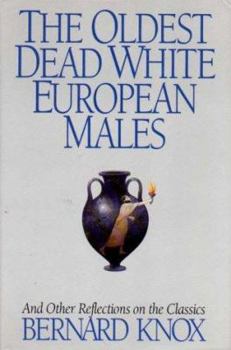The Oldest Dead White European Males and Other Reflections on the Classics: And Other Reflections on the Classics
Select Format
Select Condition 
Book Overview
Should the ancient Greeks - the oldest dead white European males - and their legacy have any relevance to the way we live now? So much of what the ancients were and did may now appear positively racist and sexist in this era of multiculturalism.
Format:Hardcover
Language:English
ISBN:0393034925
ISBN13:9780393034929
Release Date:January 1993
Publisher:W. W. Norton & Company
Length:144 Pages
Weight:0.79 lbs.
Dimensions:0.7" x 5.7" x 8.5"
Customer Reviews
3 ratings
kudos and thanks
Published by Thriftbooks.com User , 15 years ago
This is a lovely book from a fine scholar and teacher who opens the door to the "classics" and gracefully and cogently addresses some who regard the classical tradition as merely the repository of outdated unenlightened work superseded by the enlightened pomo wisdom. Much better than the fulminations of Victor David Hanson, and particularly valuable for those seeking entry into "Greek " culture which, as Knox says so well, didn't expire with Alexander or even the Byzantines. Knox must be congratulated for his honesty, his elegant writing, and his clear sighted view of both ancient and modern Greece.
Dr. Knox to the rescue
Published by Thriftbooks.com User , 22 years ago
Dr. Knox first presents a lively defense of the study of the ancient Greeks as an important part of a liberal arts education - there's value in the ancients if you look beyond the stereotypes. Next he defends the liberal arts education itself - again value beyond the stereotypes. Finally, he defends the modern Greeks against his fellow Classics scholars, who surprisingly have been perpetuating a stereotype about how visiting Greece is disappointing and learning modern Greek is damaging to the "ear."All told, an entertaining read.
An eloquent defense of classical studies
Published by Thriftbooks.com User , 22 years ago
Dr. Knox dares to stand up for the ancient Greeks and their pivotal influence on Western society in this rather short collection of three essays. His message is largely a response to the modern calls from multiculturalists and "radical feminists" downplaying or even condemning the importance of the humanities in today's academic world. The overspecialization that is the inevitable product of multiculturalism sees only the faults in ancient Greek society--slavery, a limited and inferior role for women, the crudities of ritual sacrifice, an undemocratic democracy, etc.. Knox acknowledges the validity of such criticism, but he argues cogently that Greek culture and its pervading influence on the West cannot be examined solely through a narrow lens. Some modern critics have even gone so far as to label ancient Greek society a reactionary force enforcing conformity. This, as Knox explains very well, is ludicrous. The study of the classics has long been the wellspring from which innovative, radical, and even subversive new ideas emerge. Certainly, ancient Greek society was flawed in certain ways, but the fact remains that this culture bequeathed us the very foundations of our politics, philosophy, drama, rhetoric, science, etc. The very playing field upon which modern critics denigrate the influence of the ancient Greeks was essentially constructed by their long-dead opponents. I was most impressed by Knox's analysis of the recent history of the humanities in Western culture. Until the last century, education was largely an aristocratic privilege. The Industrial Revolution set in motion a recomposition of society, one that now dwells more and more on "practical" education; it is this social metamorphosis that has done much to call into question the role of the humanities in education today. Do not throw out the baby with the bath water, Knox warns. The world we have created reflects the vast influence of the ancient Greeks, but more importantly, that influence is even still working actively to challenge modern thinkers. While we have learned a great deal from the culture of the oldest dead white Europeans, we yet have much more to learn from them. Even should the humanities and classical studies be suppressed tomorrow, their value, beauty, and utility are such that they would soon return to the forefront of intellectual and academic studies despite the wishes of modern critics. I must say that I was disturbed by the widespread disdain for the history of "dead white guys" while immersed in my own postgraduate studies. Multiculturalism and the new social history represents a noble effort to tell the stories of men and women who have been voiceless until now, but the end result threatens to pigeon-hole and fragment academia. The study of the classics provides an education in democracy and citizenship; herein lies the secret of its eternally important influence. I rejoice in reading such an outspoken defense of the importance of the huma






